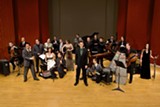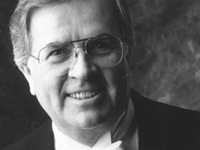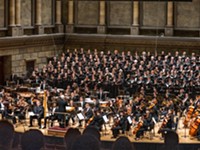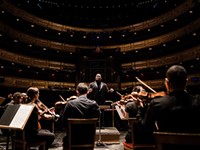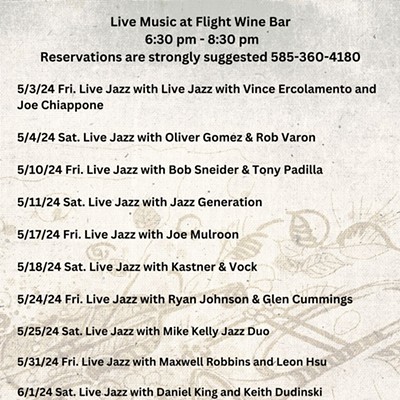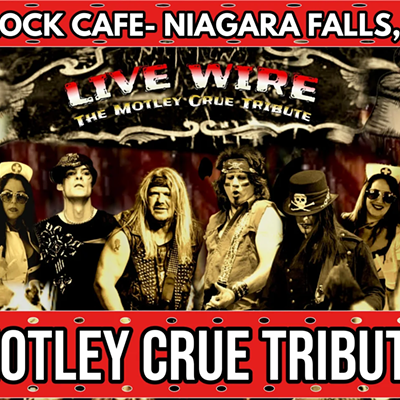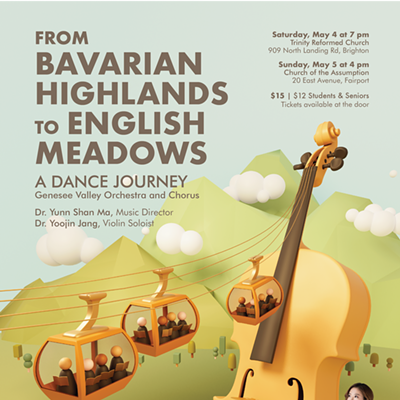CLASSICAL: Alarm Will Sound
Moving into the future, through the door marked "1969"
By Paloma Capanna[
{
"name": "500x250 Ad",
"insertPoint": "5",
"component": "15667920",
"parentWrapperClass": "",
"requiredCountToDisplay": "1"
}
]
They're calling it a "Rochester homecoming" on the Alarm Will Sound website. Indeed, for founding members of the ensemble, Alan Pierson and Gavin Chuck, the February 19 concert is precisely this. Pierson and Chuck graduated from the Eastman School of Music in 2006, and the years in between have been a rapid climb to the inner circle of coveted spots on the "New Music" scene within the classical-music world.
Next week, Alarm Will Sound brings its original performance piece "1969" to the stage of Kodak Hall at Eastman Theatre. Infused with musical selections from John Lennon, the Beatles, Karlheinz Stockhausen, Leonard Bernstein, Luciano Berio, and Yoko Ono, the Alarm Will Sound production of "1969" is anything but musicians seated in chairs on a stage, playing piece by piece.
"1969 is a multi-media event where we've woven together video, action, and music, specifically music written in 1969 in response to the upheavals going on at the time," says Chuck. "What's interesting about that period and those people is that they felt that music could and should be at the center of social transformation. Our show revisits the question, Can music be at the center of social change?"
Even before there was Alarm Will Sound, Pierson and Chuck were at the center of the contemporary evolution of classical music while studying at the Eastman School of Music. Chuck says, "I remember sitting in Spot Coffee, and before we were even a group we were talking about our identity and what we wanted to do. And right at the top of that list was to renovate the concert experience, not to have just the conventional set-up where people come in and sit down to hear piece after piece."
Pierson shares Chuck's clear philosophy, and says, "I think part of what we said Alarm Will Sound was going to be about was to be genre agnostic. That's no longer a crazy idea, but it was, at the time. The idea of that meeting in 1969 of avant-garde new music and avant-garde pop music is equally the modern story of Alarm Will Sound."
Pierson and Chuck found the atmosphere at ESM to be supportive of their tendencies toward new music. While students, they founded OSSIA, a student-run, new music group with a continued, strong presence at ESM. Chuck says, "My experience at Eastman was not that it was that conservative or, if there was a strong conservative strain, there was still room for us to react to it."'
Listening to Chuck, his reverence for the musical figures of the late 1960's is apparent. "I feel like the environment we live in today was created by people like Lennon and Stockhausen talking to each other," he says. "Maybe that kind of cross-genre or cross-pollination didn't happen in the immediate years following 1969, but for us – as a young generation, doing that music now – it's really like a lost promise fulfilled."
After graduating from ESM, Pierson and Chuck started Alarm Will Sound and began making unusual composer pairings for concert performances. Pierson says that the idea for "1969" began in a conducting workshop, where he played with the idea of a concert organized around a single year. "Something I've always been interested in is how to organically connect really different kinds of music in ways that feel like a whole," says Pierson. "1969 was one of the years I started looking at. Then I made a list of what music was written in 1969. The anecdote of the meeting between Stockhausen and the Beatles came out and that became the nucleus of the whole show."
For one of the other members of Alarm Will Sound, Matt Marks, his work centered on creating an orchestration of the Beatles' "Revolution No. 9," which Marks describes as "their weirdest and longest piece from the 'White Album.'"
"It's a taped piece with crazy sounds, recordings, some music – it's a big sound collage about eight or nine minutes long," says Marks. "To mainstream audiences, it's notorious for being the worst Beatles song, but, as far as contemporary art music goes, it's a huge piece of experimental and tape music."
Marks' assignment was not insignificant. He didn't have access to anything other than the finished album recording, so he listened to it hundreds of times in all different ways to deconstruct the noise. Marks arrived at a methodology of left-forward, left-backwards, right-forward, and right-backwards, reflecting left and right tracks and whether sound was playing forwards or backwards. When his reaction was "what is this crazy air shit going on?," Marks pulled down the meter and used digital audio stretching or filters until he could "hear it." He even set out a type of written or graphic score for the piece.
"There was a tension of not wanting to make the orchestration not sound like the London Symphony Orchestra plays the Beatles," says Marks. "I tried to hear the sounds as music and appreciate the sounds on their own terms. I let each sound come to me and then I let those sounds connect."
Even with all of these musical ideas stretching back to the time of the band's formation, the explorations of Alarm Will Sound evolved even further into fully staged productions for the 20-member group, working with a staging director, Nigel Maister.
"Alarm Will Sound is introducing a heightened element into many of their concerts," says Maister, co-creator and director of "1969." "They use theatricalized staging for music that originally did not have a performative element in it, but they are extracting it from the music."
The challenge for Maister, the artistic director of the University of Rochester's International Theatre Program, is to take what may sound "quite challenging and quite daunting" to the average listener and translate it into physical space to create a more intense and engaging experience, while not messing with the tradition. He also faces the constraints of 18 to 20 musicians on stage, some of whom carry big instruments or who play instruments that should be played sitting down.
"These guys are very open as far as musicians go, but they still are very trained to do what musicians do," says Maister. "The quality of the technique is obviously paramount to them. There's a push and pull about what can this piece be and how perfect does it have to sound. I've had to learn how to adapt my expectation and the way I work them; they've have to adapt the way they play."
Maister, who considers new music circles to be embracing of all elements across genres from pop to classical, says, "It would be arrogant to say Alarm Will Sound opened this door to XYZ, but I would hope that Alarm Will Sound, in conjunction with other new-music ensembles and some orchestras as well, have opened the door to experiencing the totality of music in a new way, to explode the boundaries of what is accepted musical practice."
In his interview, Chuck acknowledged a persistent, even if diminished, divide between popular music and culture and classical music and culture. Chuck says this doesn't bother him too much.
"Our responsibility as artists is to find and do what we find compelling and hope the audience will be invited to lean forward and meet us half way," says Chuck. "I'm quick to say that I love all those masterpieces by Brahms and Beethoven, but I want somehow to communicate to my contemporaries that they can do the same thing for somebody 200 years from now by being engaged with new music. The highest calling you could have is to transform the world, no merely to copy it."
Speaking with Pierson, Chuck, and Marks, the individual interviews all came down to questions of whether Alarm Will Sound is picking up where the earlier cross-genre explorations failed for the likes of iconic composers like Lennon, the Beatles, Stockhausen, Bernstein, and others. Is Alarm Will Sound picking up where they left off? Where will this wave of cross-genre musical productions lead? What will people say in 50 years about Alarm Will Sounds' "1969?"
Pierson says it's "not for me to say" what magnitude of impact a group like Alarm Will Sound has and will continue to have on music, but he is willing to say, "We've been raised at a time when there wasn't really another group like this. There was a need for it. There was all this good music being written and we had the support – we had Eastman and [composer] Steve Reich. And we had the benefit of 1969 being our past. They were trailblazers opening up a new territory that needed time to be understood so that generations later could grow up living in that territory – not breaking into it. When the characters in 1969 started to make these connections, it wasn't natural. Now, it feels much more natural. Now it's not your grandfather's new music."
Latest in Classical
More by Paloma Capanna
-

The multisport multiverse
Apr 30, 2014 -
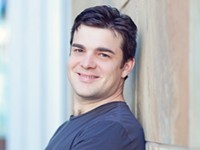
CLASSICAL | Rochester Philharmonic Orchestra
Apr 9, 2014 -
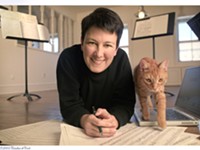
CLASSICAL | ESM Women in Music Festival
Mar 26, 2014 - More »
